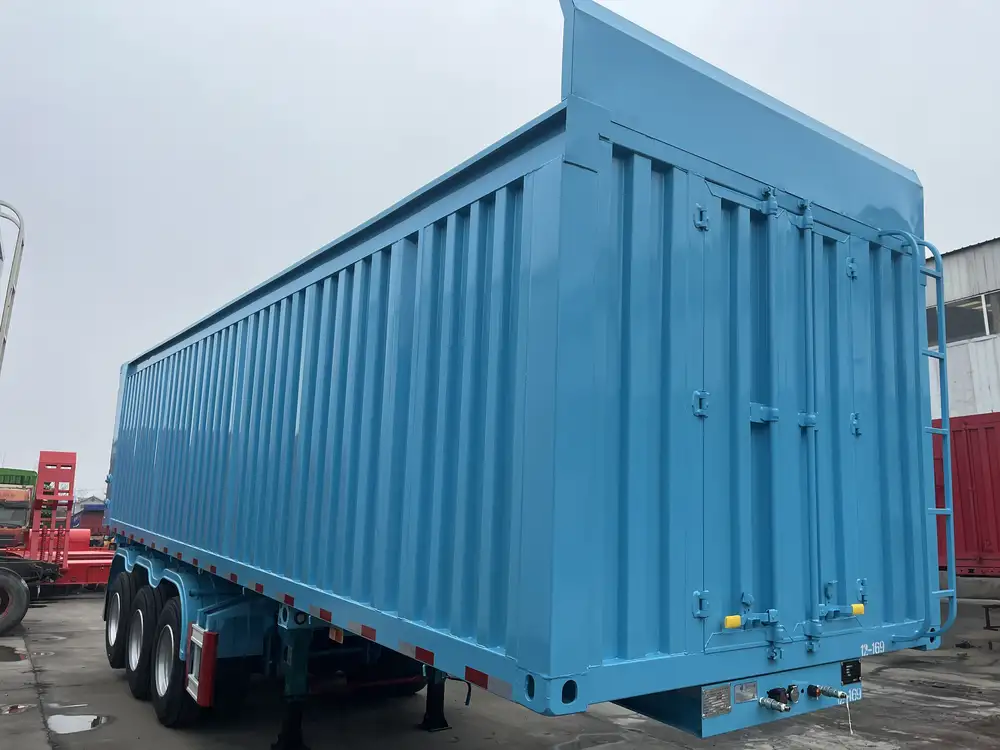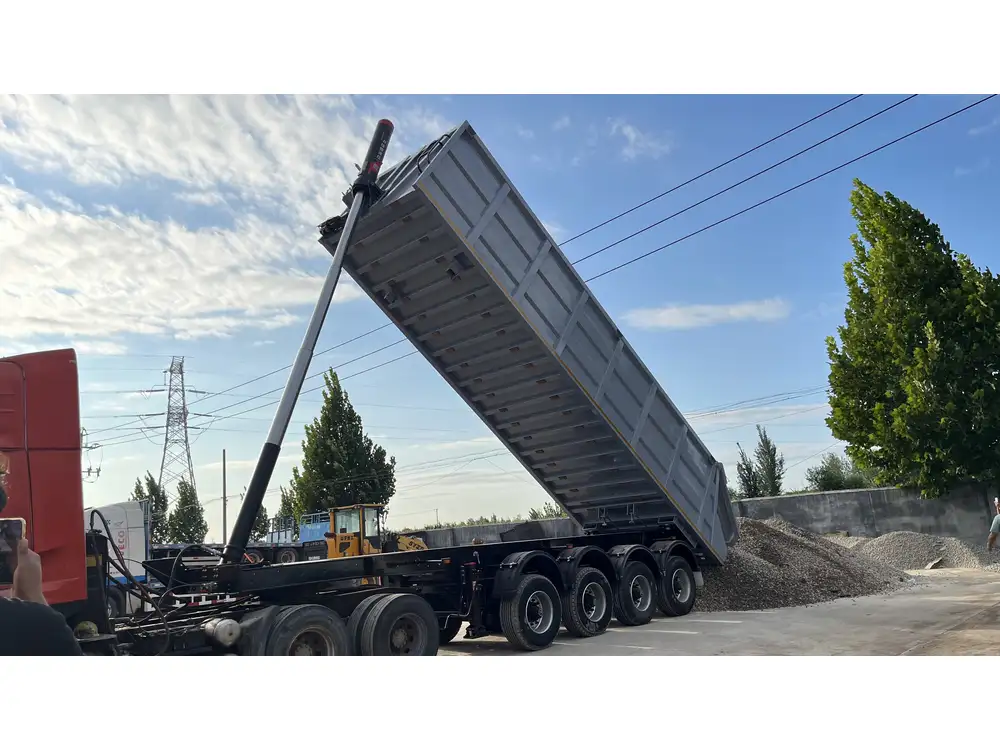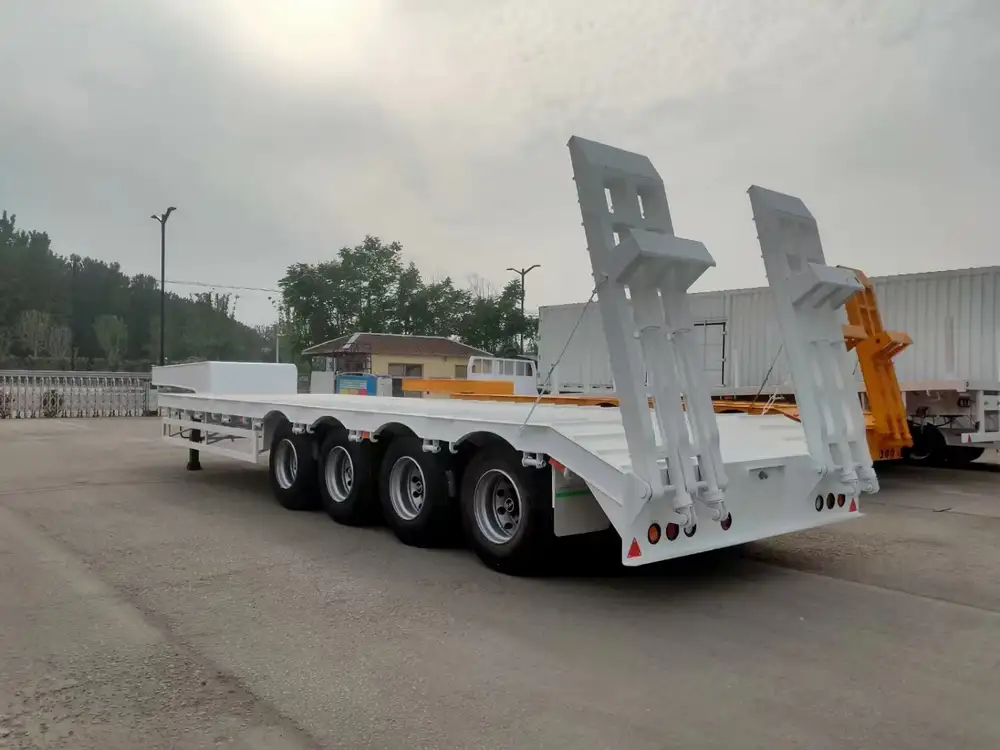Dump trailers have revolutionized the way we manage heavy loads and construction debris. One critical aspect that often surfaces when discussing dump trailers is hydraulic fluid usage. In this article, we will meticulously explore how much hydraulic fluid a dump trailer typically uses, the factors that influence this consumption, and essential considerations for maintaining an efficient hydraulic system.
What is Hydraulic Fluid and its Role in Dump Trailers?
Hydraulic fluid is a specialized liquid that transmits power within hydraulic machinery. In a dump trailer, hydraulic fluid facilitates the movement of the trailer’s lifting mechanism, allowing it to raise and lower heavy loads seamlessly. The fluid’s properties enable it to provide lubrication, cooling, and protection against corrosion and wear.
Benefits of Using Hydraulic Fluid
Using hydraulic fluid in dump trailers comes with numerous advantages, including:
| Benefit | Description |
|---|---|
| Power Transmission | Hydraulic fluid efficiently transfers power from the pump to the hydraulic cylinder. |
| Load Management | Controls the precise lifting and lowering of heavy cargo, enhancing safety. |
| Versatility | Adaptable for various trailer types and sizes, supporting different hydraulic systems. |
| Lubrication | Reduces friction and wear on mechanical parts, extending their lifespan. |
| Temperature Control | Helps in dissipating heat generated from operation, protecting components. |

How Much Hydraulic Fluid Does a Dump Trailer Use?
The amount of hydraulic fluid used in dump trailers can vary significantly based on several factors. While there is no one-size-fits-all answer, a general understanding of fluid capacity and usage patterns can provide a clearer picture for manufacturers and operators alike.
Typical Hydraulic Fluid Capacities
Dump trailers often come with different hydraulic systems based on their size, type, and intended use. Here’s a breakdown of typical hydraulic fluid capacities based on dump trailer sizes:
| Size of Dump Trailer | Typical Hydraulic Fluid Capacity |
|---|---|
| Small (5-10 ft) | 3 to 5 gallons |
| Medium (10-14 ft) | 5 to 10 gallons |
| Large (14-20 ft) | 10 to 15 gallons |
Typically, a standard hydraulic system in a dump trailer can utilize anywhere from 3 to 15 gallons of hydraulic fluid. It’s important to recognize that this is a general guideline, and specific requirements may vary according to the manufacturer and design specifications.
Factors Influencing Hydraulic Fluid Usage
The hydraulic fluid consumption in dump trailers hinges on a combination of the following factors:

1. Trailer Size and Design
The overall dimensions and the design of a dump trailer directly impact the hydraulic fluid capacity. Larger trailers equipped with bigger hydraulic cylinders will necessitate more fluid compared to compact designs.
2. Cylinder Size
The size of the hydraulic cylinders is pivotal. Larger cylinders, used typically for heavier loads, require additional hydraulic fluid to operate effectively. Conversely, trailers with smaller cylinders will have lower fluid demands.
3. Load Weight
The weight of the load being transported significantly affects hydraulic fluid usage. Heavier loads require more fluid to lift, resulting in higher consumption levels to facilitate the necessary hydraulic pressure.

4. Usage Frequency
How often the dump trailer is used influences total hydraulic fluid consumption. Frequent operation leads to a gradual decrease in fluid levels, necessitating regular checks and refills.
5. Operating Conditions
Extreme temperatures and environmental conditions can affect how hydraulic fluid functions within the system. A trailer used in harsher climates may require adjustments in fluid levels to maintain optimal performance.
Optimal Maintenance of Hydraulic Fluid Systems
To preserve the efficiency of a dump trailer’s hydraulic system, regular maintenance is essential. Below are important maintenance practices designed to manage hydraulic fluid effectively:

1. Regular Fluid Level Checks
Routine inspections should be conducted to ensure that the hydraulic fluid levels are adequate. Keeping track of fluid levels prevents air ingress and ensures that the hydraulic system operates at optimal efficiency.
2. Fluid Quality Monitoring
Hydraulic fluid needs to be monitored for contamination. Any signs of dirt, oil degradation, or particulates should prompt an immediate fluid change.
3. Scheduled Fluid Changes
Establishing a regular schedule for hydraulic fluid replacement, according to the manufacturer’s guidelines, will optimize performance and prolong the life of the hydraulic system.

4. Inspect Hydraulic Hoses and Connections
Regularly checking hydraulic hoses and connections for leaks, wear, or damage can prevent fluid loss and maintain system integrity.
5. Temperature Control
Monitoring the operating temperature of hydraulic systems can help mitigate overheating, which may cause fluid breakdown. Utilizing thermal sensors may be beneficial in maintaining appropriate temperatures.
Troubleshooting Common Hydraulic Fluid Issues
During operation, several issues may arise regarding hydraulic fluid systems in dump trailers. Here are some common problems and how to address them:

1. Low Fluid Levels
Symptoms: Reduced lift capacity or slow operation.
Solution: Check the fluid reservoir and add the appropriate hydraulic fluid if levels are low. Investigate possible leaks.
2. Overheated Fluid
Symptoms: System pressure fluctuations, odd smells, or discolored fluid.
Solution: Identify the heat source, such as overworking the trailer. Allow the system to cool and consider fluid replacement.
3. Dirty or Contaminated Fluid
Symptoms: Excessive wear on components or sluggish operation.
Solution: Perform routine fluid analysis and replace any contaminated fluid immediately.

4. Air in the System
Symptoms: Unresponsive or erratic movements.
Solution: Bleed the hydraulic system to remove air pockets, ensuring all connections are secure.
5. Fluid Leaks
Symptoms: Noticeable fluid spots under the trailer or constant fluid level drops.
Solution: Inspect hoses and seals for damage and replace as necessary. Monitoring and regular maintenance can often prevent these leaks.
FAQs About Hydraulic Fluid in Dump Trailers

1. What type of hydraulic fluid should I use for my dump trailer?
It’s recommended to use hydraulic fluids that meet ISO standards suitable for the operating temperature conditions of your trailer. Consult the manufacturer’s guidelines for specific recommendations.
2. How often should I change the hydraulic fluid?
Generally, changing the hydraulic fluid every 3,000 to 5,000 operating hours is advisable, though regular monitoring may suggest more frequent changes based on operational conditions.
3. Can I mix different brands of hydraulic fluid?
Mixing different brands is typically not recommended due to potential chemical incompatibility. Always aim to use the same brand and type as what is already in your system.

4. How can I tell if my hydraulic fluid is degraded?
Degraded hydraulic fluid often exhibits changes in color, odor, and viscosity. If you notice any of these alterations, it’s time for a fluid change.
5. What should I do if I encounter a hydraulic system malfunction?
Stop operation immediately and inspect the components. Consult the trailer’s manual or a professional repair service if issues persist.
Conclusion
Understanding how much hydraulic fluid a dump trailer uses is essential for efficient operation and maintenance. By recognizing the factors affecting hydraulic fluid consumption and adhering to best practices for maintenance, operators can enhance the longevity and performance of their dump trailers. Regular checks and a thorough knowledge of hydraulic systems lead to a more reliable and effective trailer, minimizing downtime and maximizing productivity.
By following these guidelines and best practices, users can ensure their dump trailers perform optimally, whether in construction, landscaping, or waste management. Remember, a well-maintained hydraulic system is the heart of a reliable dump trailer, driving efficiency and safety on every job site.



